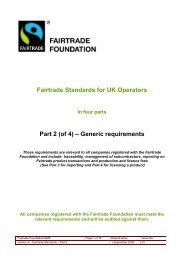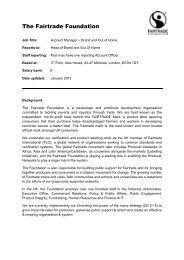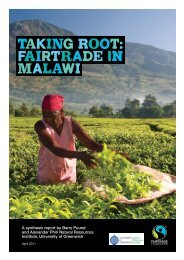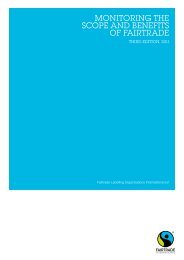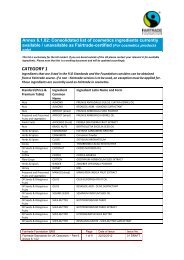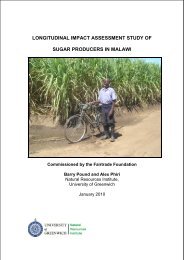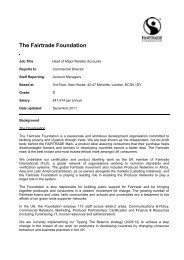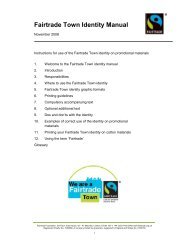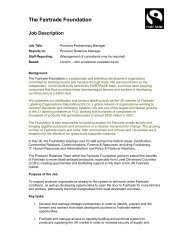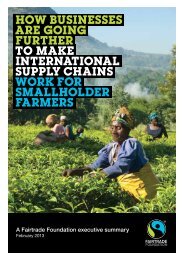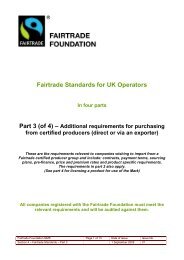the great cotton stitch-Up - The Fairtrade Foundation
the great cotton stitch-Up - The Fairtrade Foundation
the great cotton stitch-Up - The Fairtrade Foundation
You also want an ePaper? Increase the reach of your titles
YUMPU automatically turns print PDFs into web optimized ePapers that Google loves.
Great Powers still dominate <strong>the</strong> WTo<br />
<strong>The</strong> <strong>cotton</strong> case has also shown that <strong>the</strong> system<br />
continues to be biased in favour of big powers. <strong>The</strong><br />
old habit of <strong>the</strong> so-called Great Powers making <strong>the</strong><br />
rules and demanding developing countries ‘take it or<br />
leave it’ dies hard. Even if every country represents<br />
one ‘voice’ at <strong>the</strong> WTO and consensus is needed to<br />
ensure change in <strong>the</strong> rules, some countries are more<br />
equal than o<strong>the</strong>rs. Poorer countries that are unable (or<br />
think <strong>the</strong>y are unable) to have challenging positions<br />
are too often left behind.<br />
<strong>The</strong> Great Powers also have shown that <strong>the</strong>y know<br />
how to play <strong>the</strong> system. Today’s situation seems to<br />
validate <strong>the</strong> Great Powers’ strategy at <strong>the</strong> expense of<br />
poor countries. <strong>The</strong> WTO, now 15 years old, reflects<br />
<strong>the</strong> growing power of China, India and Brazil. But it<br />
has failed to become what it aspires to be: a truly<br />
multilateral institution that is sensitive to both <strong>the</strong><br />
needs and rights of both small and big countries alike.<br />
With <strong>the</strong> rise of <strong>the</strong> importance of <strong>the</strong> emerging<br />
markets in <strong>the</strong> Doha negotiations, WTO policies have<br />
come under scrutiny. Important <strong>cotton</strong> producing<br />
countries such as China and India also subsidise <strong>the</strong>ir<br />
<strong>cotton</strong> production. <strong>The</strong> EU and <strong>the</strong> US argue <strong>the</strong>se<br />
countries’ subsidies will be, in <strong>the</strong> longer term, more<br />
significant to African <strong>cotton</strong> producers than OECD<br />
countries’ subsidies.<br />
‘<strong>The</strong> C-4 case<br />
demonstrates <strong>the</strong><br />
system is biased<br />
in favour of <strong>the</strong><br />
Great Powers.’<br />
But total Chinese subsidies last year worked out<br />
at about $20 per farmer, while most Indian <strong>cotton</strong><br />
farmers struggle to make a meagre income. US <strong>cotton</strong><br />
farmers can receive millions of dollars in subsidies<br />
each year, while EU farmers receive <strong>the</strong> highest per<br />
pound of all.<br />
Doha deadlock and <strong>the</strong> need for<br />
action beyond <strong>the</strong> WTo<br />
To achieve a breakthrough in <strong>the</strong> Doha negotiations,<br />
African <strong>cotton</strong> producing countries have to ensure<br />
that <strong>the</strong> <strong>cotton</strong> subsidies issue is addressed in US<br />
and EU internal debates, within <strong>the</strong> framework of <strong>the</strong>ir<br />
own national reform processes and streng<strong>the</strong>ned by<br />
domestic-based arguments for change.<br />
Two major players will define what will be included<br />
in a final Doha deal in terms of domestic support<br />
for <strong>cotton</strong>: <strong>the</strong> US, as <strong>the</strong> biggest <strong>cotton</strong> subsidiser<br />
by total value and <strong>the</strong> EU, as <strong>the</strong> biggest <strong>cotton</strong><br />
subsidiser per pound.<br />
As far as <strong>the</strong> US is concerned, <strong>the</strong> pressure to<br />
reform its <strong>cotton</strong> support regime is reinforced by <strong>the</strong><br />
dispute settlement ruling which authorizes Brazil to<br />
retaliate against <strong>the</strong> US. At present, higher <strong>cotton</strong><br />
prices undermine to a degree <strong>the</strong> C-4’s powerful<br />
‘Cotton subsidy<br />
reform hinges on<br />
<strong>the</strong> US Farm Bill and<br />
<strong>the</strong> EU CAP which is<br />
happening now.’<br />
Moussa Keita, <strong>cotton</strong><br />
farmer in Dogourakoroba,<br />
Mali, checking his harvest<br />
arguments to request <strong>the</strong> elimination of subsidies that<br />
are price-based. However, <strong>the</strong> existence of subsidy<br />
mechanisms already creates a distortion because<br />
US farmers receive a guaranteed price whatever<br />
happens to <strong>cotton</strong> prices in <strong>the</strong> future. <strong>The</strong>refore,<br />
<strong>the</strong>y are encouraged to continue to produce <strong>cotton</strong>.<br />
As far as <strong>the</strong> EU Commission is concerned, it has<br />
always considered that EU <strong>cotton</strong> production does<br />
not have an impact on <strong>the</strong> world <strong>cotton</strong> market as it<br />
is not exported and is limited in quantity. Moreover,<br />
<strong>the</strong> EU argues that it has already made steps in <strong>the</strong><br />
right direction by redesigning its <strong>cotton</strong> subsidies and<br />
making <strong>the</strong>m less trade distorting.<br />
<strong>The</strong> uS Farm Bill and <strong>the</strong> Eu<br />
Common Agricultural Policy<br />
A resolution of <strong>the</strong> global <strong>cotton</strong> subsidy issue hinges<br />
on <strong>the</strong> next US Farm Bill, which is scheduled for<br />
2012, and <strong>the</strong> EU CAP reform process, scheduled for<br />
implementation in 2013.<br />
<strong>The</strong> US-Brazil settlement colours how <strong>the</strong> US deals<br />
with <strong>cotton</strong> in its Farm Bill. And it is <strong>the</strong> Farm Bill that<br />
will define <strong>the</strong> US position as it approaches fur<strong>the</strong>r<br />
DDR <strong>cotton</strong> negotiations. In this context, C-4<br />
countries and civil society organisations need to<br />
campaign for <strong>the</strong> US to introduce within <strong>the</strong> next Farm<br />
Bill a reform of <strong>the</strong> <strong>cotton</strong> support regime that goes<br />
beyond its legal requirements to fulfil commitments it<br />
made at <strong>the</strong> WTO Hong Kong Ministerial.<br />
Though <strong>the</strong> US is <strong>the</strong> major culprit, EU <strong>cotton</strong><br />
policy remains distorting and its position within <strong>the</strong><br />
negotiations remains essential. First, <strong>cotton</strong> subsidies<br />
remain more trade distorting than o<strong>the</strong>r crop<br />
subsidies in <strong>the</strong> EU and so contradict EU efforts to<br />
increase policy coherence between development and<br />
o<strong>the</strong>r EU policies. It is particularly disturbing to realise<br />
that <strong>the</strong> EU – for which <strong>cotton</strong> is a minor issue – is<br />
not willing or able to take into account <strong>the</strong> interests of<br />
<strong>the</strong>ir development partners. Second, as long as <strong>the</strong><br />
EU remains a <strong>cotton</strong> subsidiser, it gives <strong>the</strong> US cover<br />
within <strong>the</strong> negotiation and <strong>the</strong>reby minimises <strong>the</strong><br />
pressure that could be put on US authorities.<br />
Despite this, <strong>the</strong> <strong>cotton</strong> issue is not on <strong>the</strong><br />
European Commission’s agenda. <strong>The</strong>refore, it is<br />
essential to mobilise members of <strong>the</strong> European<br />
Parliament to ensure that <strong>the</strong> <strong>cotton</strong> issue is addressed<br />
in <strong>the</strong> debate on <strong>the</strong> Common Agricultural Policy.<br />
30 <strong>The</strong> <strong>great</strong> <strong>cotton</strong> <strong>stitch</strong>-up <strong>The</strong> <strong>great</strong> <strong>cotton</strong> <strong>stitch</strong>-up 31



